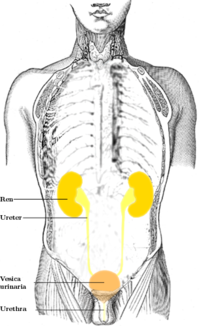
Photo from wikipedia
Background Cyclin‐dependent kinase inhibitor 1B (p27Kip1) is a cell‐cycle inhibitor whose ‐838C>A single nucleotide polymorphism (rs36228499; hereafter called p27 SNP) has been associated with the clinical failure of peripheral vein… Click to show full abstract
Background Cyclin‐dependent kinase inhibitor 1B (p27Kip1) is a cell‐cycle inhibitor whose ‐838C>A single nucleotide polymorphism (rs36228499; hereafter called p27 SNP) has been associated with the clinical failure of peripheral vein grafts, but the functional effects of this SNP have not been demonstrated. Methods Human saphenous vein adventitial cells and intimal/medial smooth muscle cells (SMCs) were derived from explants obtained at the time of lower extremity bypass operations. We determined the following in adventitial cells and SMCs as a function of the p27 SNP genotype: (1) p27 promoter activity, (2) p27 messenger (m)RNA and protein levels, and (3) growth and collagen gel contraction. Deoxyribonuclease I footprinting was also performed in adventitial cells and SMCs. Results p27 promoter activity, deoxyribonuclease I footprinting, p27 mRNA levels, and p27 protein levels demonstrated that the p27 SNP is functional in adventitial cells and SMCs. Both cell types with the graft failure protective AA genotype had more p27 mRNA and protein. As predicted because of higher levels of p27 protein, adventitial cells with the AA genotype grew slower than those of the CC genotype. Unexpectedly, SMCs did not show this genotype‐dependent growth response. Conclusions These results support the functionality of the p27 SNP in venous SMCs and adventitial cells, but an effect of the SNP on cell proliferation is limited to only adventitial cells. These data point to a potential role for adventitial cells in human vein graft failure and also suggest that SMCs express factors that interfere with the activity of p27. Clinical Relevance Approximately 400,000 vein grafts are used each year to bypass coronary and peripheral arterial occlusive disease, and ˜30% of the grafts fail in the first year because of intimal hyperplasia and pathologic remodeling. This high rate of failure has not changed in 40 years. Animal models of vein grafts have put the spotlight on the smooth muscle cells of the inner vein wall, but animal models may not accurately reflect this human disease. The current study implicates the adventitial cells of the outer wall in graft failure.
Journal Title: Journal of Vascular Surgery
Year Published: 2018
Link to full text (if available)
Share on Social Media: Sign Up to like & get
recommendations!